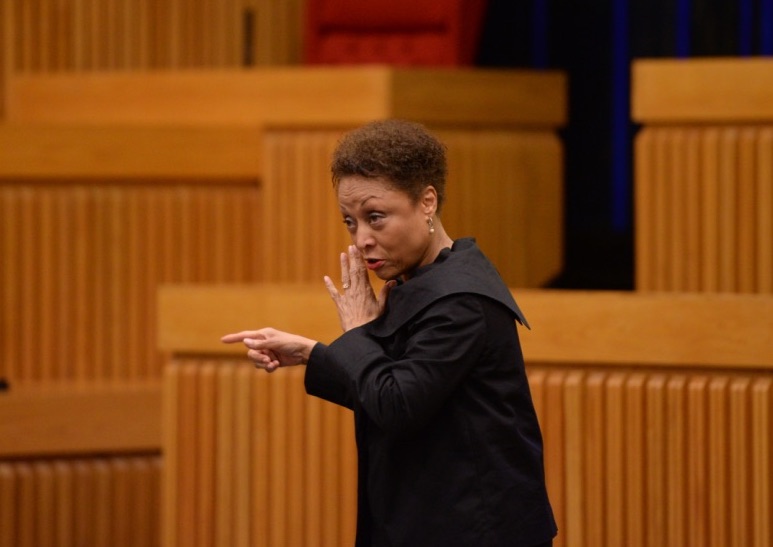Janet Dewart Bell debuts book at Barco Law


Social justice activist Janet Dewart Bell spoke about her new book “Lighting the Fires of Freedom” at a talk in Barco Law Building Thursday evening.
Leah Chase can’t be found in most history textbooks; neither can June Jackson Christmas or Kathleen Cleavers. But Janet Dewart Bell is telling their stories in her debut book, “Lighting the Fires of Freedom,” about African American women in the Civil Rights Movement.
Bell spoke at Pitt’s Barco Law Building on Thursday in the Teplitz Memorial Moot Courtroom. With seven plush red chairs lining its judges’ bench and mosaic background, the room is largely used as a classroom and a space for mock trials, but on Thursday, it hosted an audience of several dozen. Pitt Law students and faculty came to hear Bell talk about the women who made up the backbone of the Civil Rights Movement.
“My research is to show that leadership can come from any place,” Bell said. “You can lead from the middle of the pack. You do not have to have a title to lead.”
During her hour-long talk, Bell did more than read excerpts from her book. She told stories about her family, talked about the roots of the Civil Rights movement in the Jim Crow South, and led the crowd in song, singing the gospel hymn, “Lord, I’ve Done What You Told Me To Do.”
“Lighting the Fires of Freedom” contains Bell’s interviews with nine African American women who played a role in the movement. Several of them were 90 or older by the time Bell interviewed them.
“What these women represent to me is authenticity, courage and purpose,” Bell said.
Chase, one of those women, illegally hosted meetings of Civil Rights workers in her restaurant in the 1960s. Christmas founded a community psychiatric program in Harlem. Cleavers was the communications secretary for the Black Panther Party.
In one excerpt Bell read, Myrlie Evers, the wife of activist Medgar Evers, who was killed in 1963, describes her work alongside her husband.
“I did research for his speeches,” Evers said in an interview with Bell. “I even wrote some of them.”
It’s a time Bell lived through too. She told a story about a Ku Klux Klan rally held in southern Virginia in 1967, which she and some friends attended in protest.
“When the Klan realized that there were people there not of their kind, we decided it was time for us to leave,” Bell said. “I did my little bit in the movement.”
Ex-Pitt Law-Dean William “Chip” Carter, who stepped down in 2017 to return to a faculty position, introduced Bell as his “dear friend,” connected to Pitt through her late husband, Derrick Bell. Derrick Bell graduated from Pitt Law in 1957 and went on to become the first tenured African American professor at Harvard Law.
Derrick Bell, Carter said, was a role model for him, the first black man he saw working in law.
“And Janet,” he said, “I want you to know that somewhere, there is some person who will be reading this book and will have the same experience that I had.”
Carter noted Janet Dewart Bell’s contributions to Pitt Law since her husband’s death. The “Derrick Bell Fund for Excellence,” funded in part by Bell, currently endows a full tuition scholarship at the Law School. Bell also founded an annual “Derrick Bell Lecture” at New York University’s Law School, which Carter delivered in 2013.
Bell’s book is dedicated to her husband and to her mother, who Bell said was a true believer in the promise of America.
“She could not go to school beyond the eighth grade, because the nearest school for black children was 100 miles away in Little Rock, Arkansas,” she said.
Decades later, Bell said, the integration effort in Little Rock and throughout the country would be aided by the Little Rock Nine, a group of high schoolers who famously integrated their high school despite intense racist harassment. She compared them to the students of Marjory Stoneman Douglas High School, who spoke out after a shooting at their school earlier this year.
“Those wonderfully brave children,” she said.
Jasmine Gonzales Rose, a Pitt Law professor, said she has long been a fan of works by both Dr. Bell and her husband, but she thinks there’s a particular relevance to the stories Dr. Bell tells in her book.
“I thought it was so important to learn more about these names and these stories of these African American women in Civil Rights that we don’t hear,” Rose said. “I think it can really inspire younger women today.”
Paige DeWitt, a student at the law school, agreed.
“The timeliness of this talk is so critical for the future of all women, particularly women of color, within Pittsburgh and the world,” she said.
Recent Posts
Therese Pitman: Giving back to Pitt’s student-athletes with equality
Pitman is Pitt’s Director of Student Athlete Development where she helps student-athletes navigate their career…
Pitt speech and debate team heads to nationals
The William Pitt Debating Union, Pitt’s speech and debate team, sends students to both in-person…
Visuals: A Year in Review
The visuals desk had an interesting year. In the midst of the 2024 Presidential Election,…
De-stress events across campus offer students a break from studying
During finals week, departments across campus are offering wellness events to help students manage stress…
Pitt students share their summer plans
After a long and strenuous academic year, many students are excited to take a break.…
Column | Collaboration and connection make us better — yes, even in journalism
Today is the last day I will ever do this, and despite the amount of…

